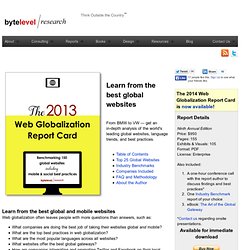

Which non-China-based web hosts provide the best connectivity to China-based users. China Web Hosting Help and Reviews 2013 – Find the Best Hosting Solutions for Your Chinese Website. A stable and fast server is a must your web success.

If you plan to enter China, it’s ideal to host your website on a server in China Mainland. However, due to local regulations and laws, an ICP license is required, to permit your website to operate in China. Without an ICP license, web hosting providers are not allowed to host your site. The good news is, even if your company doesn’t have an ICP license and is unable to host your site in China, there are still ways to make your site fast, stable and secure for Chinese users. If You Don’t Have an ICP License: Option 1: Host your website in Asia, such as Hong Kong or Japan. Asian countries and cities are geographically nearer to China, which means an Internet connection request sent from China will pass through less routers to reach the destination server in Asia, compared with Europe and America.
Asian Hosting Company Recommended: Linode (Tokyo, JP) Linode is famous for its affordable and stable VPS. DigitalOcean (Singapore)
How to create a multilingual WordPress site. The decision to create a website in more than one language is an important one, regardless of the framework in which your website is programmed.

If you use WordPress, several options already exist as plugins or plugin collections that can make the task easier and save a lot of time. Each of them is worth considering, and each provides a different set of features depending on the desired goals and objectives of the site. Careful planning and experimentation is a must to make the right decision. Localizing WordPress itself The WordPress installation itself can be localized to dozens of languages. The 2013 Web Globalization Report Card. Learn from the best global and mobile websites Web globalization often leaves people with more questions than answers, such as: What companies are doing the best job of taking their websites global and mobile?

What are the top best practices in web globalization? What are the most popular languages across all websites? What websites offer the best global gateways? How are companies integrating and promoting Twitter and Facebook on their local websites? More than a decade of web globalization research Founded in 2000, Byte Level Research was the first firm dedicated exclusively to the art and science of web globalization. We conduct a hands-on analysis of the world's leading websites, analyzing how web designs are shared across countries and mobile platforms, noting languages used on every website and mobile app, and studying local content, social media, and navigation. Global Online Payment Methods. You may be doing everything correct in multilingual search – from translating your content properly to localizing your keywords and putting proper canonical tags on the pages – and still find out that you can’t seem to sell anything online in other countries.
It might have to do with your online payment methods. Payment methods per country vary as much as the language, culture, and people vary. According to a report published by eMarketer last year, global ecommerce sales grew 21.1 percent to top $1 trillion for the first time. If you aren't part of that by now, you're missing out on huge opportunities. Vast Differences in Global Payment Methods In the U.S. we use credit cards religiously, however you might find in the UK and France that most people prefer debit cards. It isn't only what cultures use credit cards, it's also how they use them. Canadians would spend on average of $8,000 a year on credit cards, where the French would spend close to $300 per year.
Summary. 5 Tips for Developing a Global-Friendly Website. The International Business Series is brought to you by UPS.

Discover the new logistics. It levels playing fields and lets you act locally or globally. It's for the individual entrepreneur, the small business, or the large company. Put the new logistics to work for you. One of the most important aspects of the Internet is that it is location agnostic. However, just because the web allows individuals and businesses to reach out to the rest of the world doesn't mean that the rest of the world is always able to understand the message presented by the individual or business. We've compiled some tips for making your website globally friendly. 1.
Do You Need a Global Site? As a web designer or developer, you will sooner or later meet a client that wants to expand his website’s reach by adding one or more new language to it.

Or maybe you can speak several languages and want to make your own portfolio multilingual to take advantage of your language skills. In both cases, you will soon enough discover that creating multi-languages websites is a very challenging project. The challenges of creating a more international websites are varied: they make the design process harder, maintainance more time-consuming, there can be cultural or political issues, and the website is technically more complicated. Top Ten Internet Languages - World Internet Statistics.
Tallying the number of speakers of the world's languages is an increasingly complex task, particularly with the push in many countries to teach English in their public schools.

How many people can actually use the global language? David Graddol estimated a total of 750 million L1 (first or native language) plus L2 (second or nth language) speakers of English in his Future of English Report (pdf document) for the British Council. One of our subscribers, Prof. Martin Schell, has reviewed Prof. Braj Kachru's new book Asian Englishes which claims that India and China combined have over half a billion "users" of English.